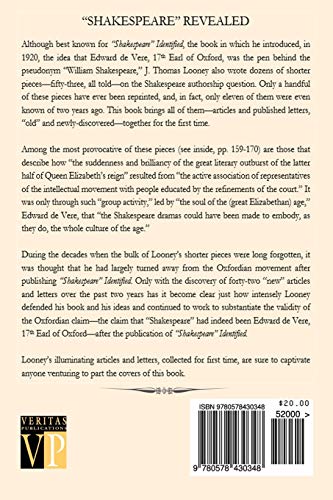Customer Services
Copyright © 2025 Desertcart Holdings Limited
Desert Online General Trading LLC
Dubai, United Arab Emirates



Full description not available
W**E
The Shakespeare Problem Solved
The articles and published letters gathered in this volume appeared in response to both criticism of J. Thomas Looney's Shakespeare Identified in Edward de Vere, Seventeenth Earl of Oxford(1920) and additional facts found by his earliest followers such as Colonel Ward and Admiral Holland. What makes these pieces so valuable is that they answer virtually all of the faults that have been found with Looney's theory: that the Earl of Oxford died in 1604; that his early verses don't strike some readers as Shakespearean; that the case has been argued and established by amateurs rather than Shakespeare scholars; and that the case is based on circumstantial evidence. Looney answers all of these criticisms in a way that does not only remove them as obstacles to acceptance of the Oxford theory but shows that the answers should strengthen the conviction of the rightness of the case for impartial and fairminded students of the subject. The following statement on the nature of circumstantial evidence gives a good example of Looney's tone, thoroughness, and objectivity:"A caution is also necessary in respect to the expression 'circumstantial evidence'. An assumption that the term has to do with an inferior form of proof has been made the cover for sheer mental laziness. The fact is that circumstantial evidence drawn from a combination of coincidences, furnishes a form of proof admitting the application of mathematical processes, and a corresponding certainty and precision. There is, therefore, no justification whatever for the attitude of those who say,'One cannot be sure about it:it is only circumstantial evidence.'"Readers of this book will find in it strong arguments against the traditional attribution of Shakespeare's plays and poems to William Shakspere (not Shakespeare) of Stratford-on-Avon, strong arguments in favor of Oxford as Shakespeare and, perhaps most important, readers will find the tone of these arguments refreshingly clear, serious, thoughtful, and convincing.This is a long overdue and welcome addition to the literature of the Shakespeare problem.
T**F
Discover the Man Who Discovered the Real Shakespeare
James A. Warren is to be commended for his diligence and scholarship in turning leaf after leaf of many books in many libraries to retrace the steps of English schoolmaster J.T. Looney in, first, discovering the real Shakespeare, Edward de Vere, 17th Earl of Oxford; and, second, defending his landmark book of 1920, "'Shakespeare' Identified," from critical attacks, misrepresentations, and misunderstandings. "Shakespeare Revealed," a collection of Looney's articles and published letters on the Shakespeare authorship controversy, is that defense.Several things come to notice: Looney was very firm in his own defense, but always temperate, a scholar speaking respectfully to and of fellow scholars as well as the public. Also, even after "'Shakespeare' Identified," Looney kept on investigating, pointing out new lines of inquiry. His sleuthing activities are amply on view here. To state one matter briefly, it has long been evident that Henry Wriothesley, the 3rd Earl of Southampton, was the Fair Youth of "Shakespeare's Sonnets." Intriguingly, when christening his infant son and successor to the Earldom of Oxford, Edward de Vere departed from family tradition, deciding not to name the boy John, Aubrey, or Robert, instead settling uniquely on "Henry." This fact naturally interested Looney, who queried in the journal "Notes and Queries" about Henry de Vere's baptismal records. While Looney never established whether the Earl of Southampton, Henry Wriothesley, stood as godfather to Edward's son Henry de Vere, at least one subsequent, Jacobean engraving of the two men riding side by side establishes their political and personal closeness, perhaps bettering Looney's good guess about the significance of the two Henrys.Finally, I was led by "Shakespeare Revealed" to look back again at aspects of "'Shakespeare' Identified" itself (also freshly edited by Mr. Warren, who noticed that a previous edition had been heavily cut without an alert for the reader). The moving conclusion to "'Shakespeare' Identified," written for readers still shaken by the cataclysm of World War One, ringingly calls upon humanity to recognize the newly identified Shakespeare as one of the spiritual leaders forever ready to point our way out of darkness. Readers will find both books enthralling, and a further, more biographical book about Looney and his quest is forthcoming.
M**D
Looney did fight back
For me, Shakespeare revealed was the perfect follow-up to finally reading Looney’s Shakespeare Identified. I had thought perhaps Looney was crushed by the derision of the criticism he received, but this collection of his articles shows he remained stalwart and effective in supporting his position. Both his book and his articles reveal his admirable qualities of thought, but the articles show him putting up a well-honed defense. It’s good to know that he never lost confidence in his ground-breaking “discovery,” despite what must have been his enormous disappointment that many people would not accept the truth he so clearly saw. As time went on, he apparently felt that the general recognition of de Vere as Shakespeare--and of Looney as his revealer—was not as momentous in the context of world events as it had once seemed to him. Still, Looney regretted that de Vere didn’t get the recognition he deserved, and now some of us have the same feeling about Looney. Let’s hope the Centennial and the two books so capably edited by James A. Warren will help bring increased recognition to them both.
Trustpilot
1 month ago
3 weeks ago